观点 | 李显龙夫人撰文:中国今非昔比,香港已失窗口角色,须重新定位
昨天(10月26日),李显龙夫人何晶po出千字脸书,正面回应港媒发表的关于新加坡从香港动荡局势中获益的文章。
她表示,随着中国改革开放,经济腾飞,香港已失去传统的“中国窗口”角色,而面对来自北上广的竞争;纠结于资金和人口向新加坡和其他地区流动并无济于事,香港应该做的是重新思考自己在中国大陆、在世界上能扮演什么角色。
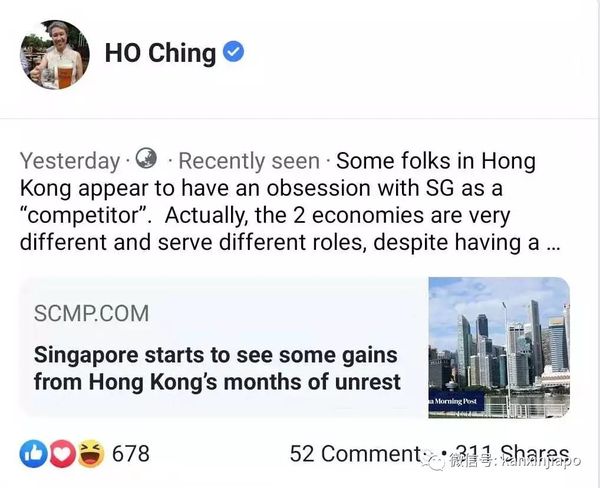
这篇回应发出后,引来不少新加坡网友点赞转发。甚至有新加坡网民呼吁香港年轻人们可以平心静气地倾听一下新加坡的观点。
翻译:很长的一篇文章但是非常值得去阅读。我的历史和政治知识让我赞同这样的观点,但是没有能力写成一篇文章。
翻译:说得好!希望更多的香港年轻人可以看到。


在长文中,何晶主要谈到以下观点:
1.新加坡并非香港真正竞争对手
何晶称“港媒纠结于资金和人口向新加坡流动(而无视资金和人口同样流向美国、加拿大、澳大利亚、英国等),完全无济于事”。
历史上,中国大陆曾经封闭,香港一度是世界通往中国的贸易窗口。但随着中国大陆的改革开放,香港逐渐失去“中国窗口”的角色,而面对来自中国大陆主要城市——上海、广州和北京——的竞争。
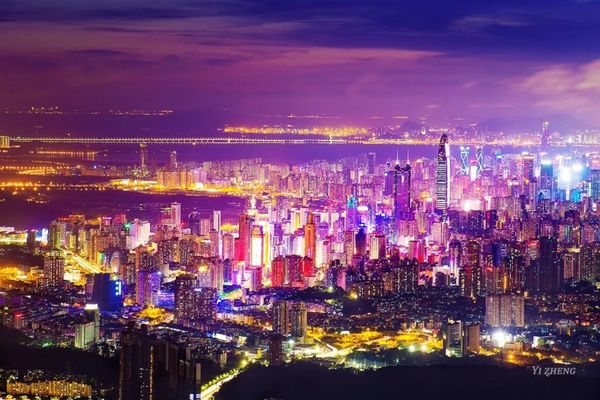
日新月异高速发展的深圳
2.香港发展前景与中国大陆密切相连
同时,何晶指出香港的发展前景与中国密切相连。“正如我们无法决定自己的出身,香港和新加坡也无法自主选择自己的地理位置。香港在历史和地理上与中国紧绑在一起,同样的,新加坡在地理上与东南亚密不可分。”
在经济发展方面“独立后的新加坡找到了生存之道。香港则向中国大陆提供服务,换取优厚经济收入。”某种意义上讲“香港成为了中国大陆的服务中心”。随着中国经济的发展,“香港对中国的真正价值是一国两制试验田,是吸引台湾回归的榜样”。
3.英国留下的政治体制,对香港无益,也非特色民主可行之路
针对最近抗议中广泛关注的民主问题,何晶也发表看法称“香港从未曾是民主社会,它如果作为民主制度的试验田,也需要摸着石头过河。”
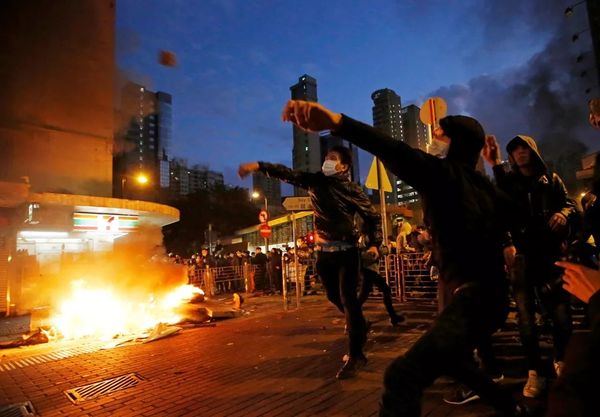
香港暴乱画面
“英国人匆匆离去之后,为香港留下的是并未经过深思熟虑的政治体制,它既对香港无益,也不是通往具有香港特色民主的可行之路,更不用说具有中国特色的民主。”
4.香港发展之道在需重审自身在中国、世界所扮演的角色
在po文的最后,何晶指出“唯有深入审视自身,从而确认自己究竟能在中国、在世界上扮演什么角色,是香港人最佳选项。唯有在中国的事务上扮演积极角色,香港在世界上才有发挥空间。”
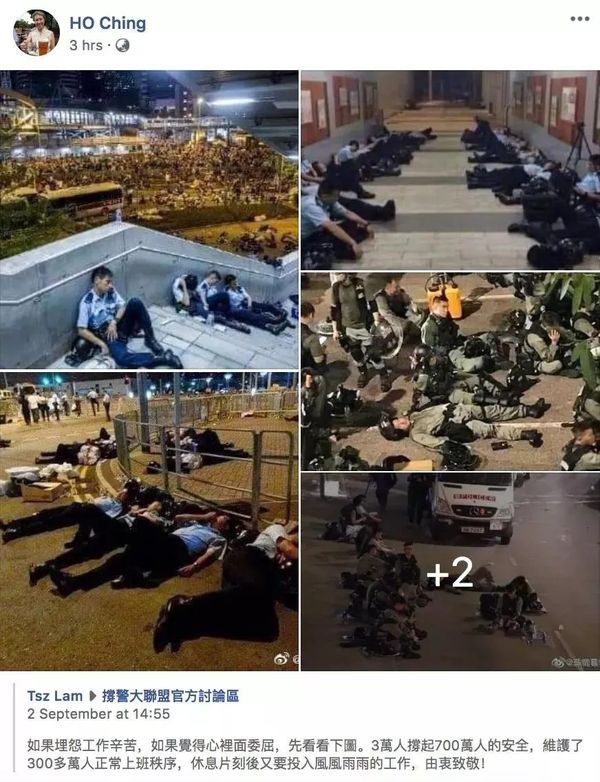
何晶曾在9月2日发表Facebook力撑香港警察
以下是何晶脸书回复的中文版全文翻译
香港的一些人似乎总爱把新加坡视为“竞争对手”。
事实上,尽管都曾历英国统治,这两个经济体却截然不同,扮演的角色也不一样。
对于现代香港,真正该问的问题是:相对于中国大陆,它扮演的是什么角色。
在英治时期,尤其是在共产党接管中国大陆之后,香港成为了通往中国大陆的贸易窗口。
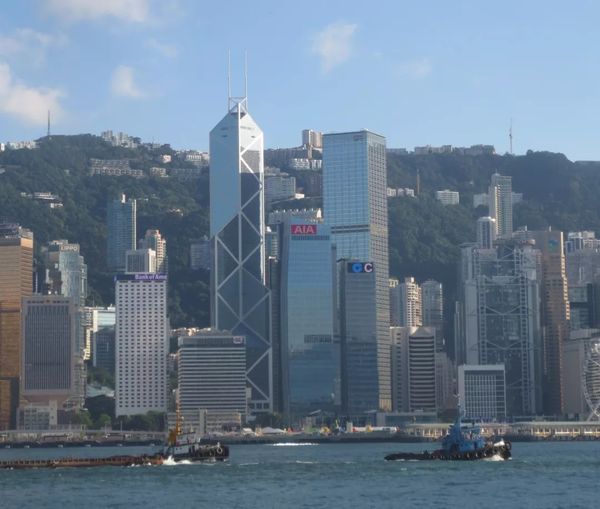
在后英治时期,中国加入世贸组织并继续改革和经济开放,香港的这个角色开始发生变化。
制造业原本占香港经济总量的20%-30%,随着香港的制造业迁往中国大陆,制造业占比很快就跌破10%。这意味着香港流失了大量的较为稳定的制造业岗位——从半熟练工人到中层主管和管理层。
如今,制造业占香港GDP的2-3%,连5%都不到。香港已经基本不存在制造业了。
所以,香港成为了中国大陆的服务中心。
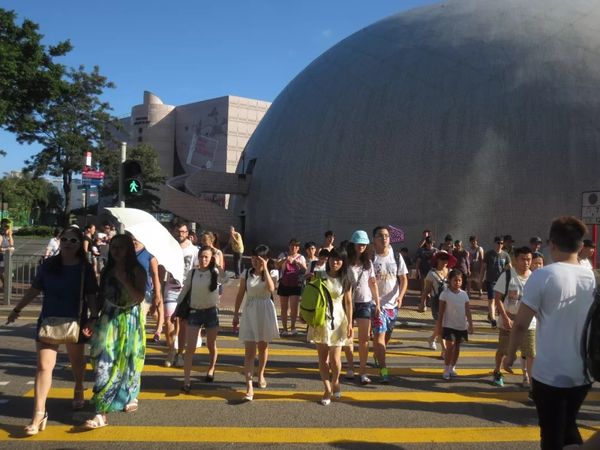
不妨回想一下:在1949年之前和英国接管香港之前,中国的金融和商业中心在哪里?
中国的主要金融中心在上海,同时,在北方的北京和南方的广州也有蓬勃发展的金融中心。
在中国悠久的历史中,直到英国人的出现,以及战后中国因“自力更生”政策的失败而封关自守,香港才开始扮演金融中心的角色,
因此,随着中国经济的开放,香港真正的竞争者其实是在中国大陆——上海、广州和北京。
随着改革开放,中国经济规模到了2000年时已达到约1万亿美元,是香港GDP的6倍。
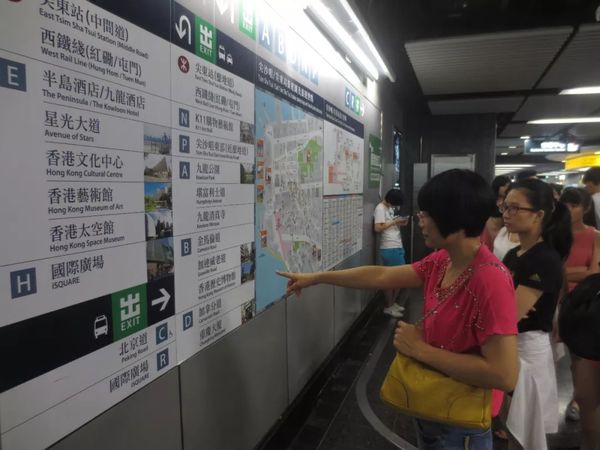
加入WTO后,中国与世界经济的进一步融合,GDP迅速增长,到了2018年增长了10倍以上。在同一时期,香港的GDP翻了一番。
香港GDP现在约占中国GDP的3%。换句话说,中国的经济规模是香港的30倍以上。
即便是深圳,虽然在1980年之前只是个人烟稀少的渔村农村,其GDP以及对全中国顶尖人才的吸引力和密集程度现都已超过香港。没错,深圳是经济特区,但即使在中国加入世贸组织之前,深圳的成功体现了中国经济开放的潜力。
因此,人们真正该问的是,香港在中国、在世界应该扮演什么角色。
纠结于资金和人口向新加坡流动(而无视资金和人口同样流向美国、加拿大、澳大利亚、英国等),完全无济于事。
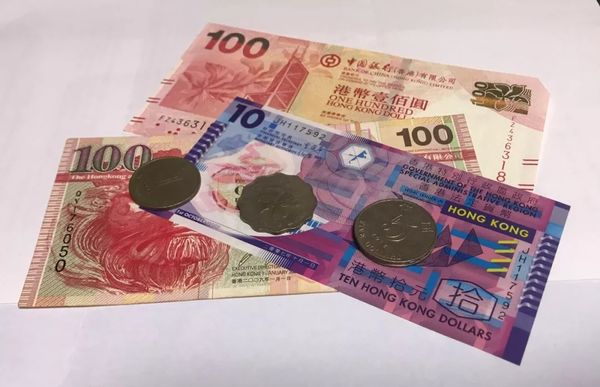
▲资金外流
正如我们无法决定自己的出身,香港和新加坡也无法自主选择自己的地理位置。
香港在历史和地理上与中国紧绑在一起,同样的,新加坡在地理上与东南亚密不可分。
英国人曾将香港作为对华贸易站,并将新加坡设置为东南亚香料的贸易站。
比之香港,新加坡多了个角色,那就是它曾经是英国远东司令部驻地,直到第二次世界大战打破了英国海军无敌的神话。
独立后的新加坡找到了生存之道。
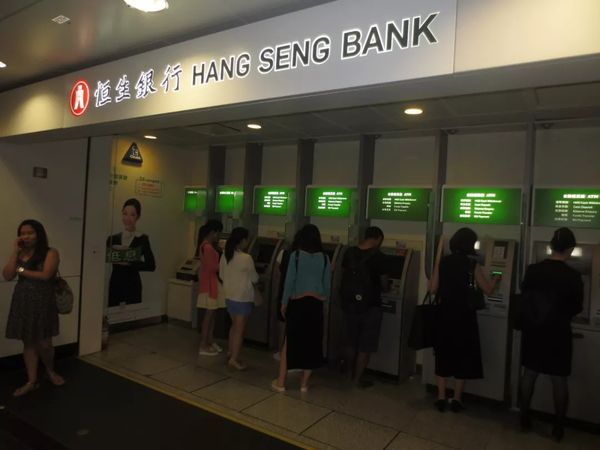
香港则向中国大陆提供服务,换取优厚经济收入。
约十年前,一些跨国企业决定把公司迁往中国大陆城市,如上海。
这是因为生活条件改善了,人们的信心增强了,因此他们将中国大陆城市视为香港的直接替代——尤其当这些企业在中国大陆设有大型制造工厂。
无可否认,一些中国人移居香港,或迁往香港工作或生活。对一些中国人而言,香港具有吸引力——它较少约束,例如没有计生要求——但是,这些在中国大陆已开始逐渐松绑。
如果中国继续放宽一些政策和改善生活条件,香港届时面临的真正挑战是自己在中国、在世界还能扮演什么角色?
在过去的22年中,香港对中国的真正价值是它是一国两制概念的试验田,是吸引台湾回归的榜样。
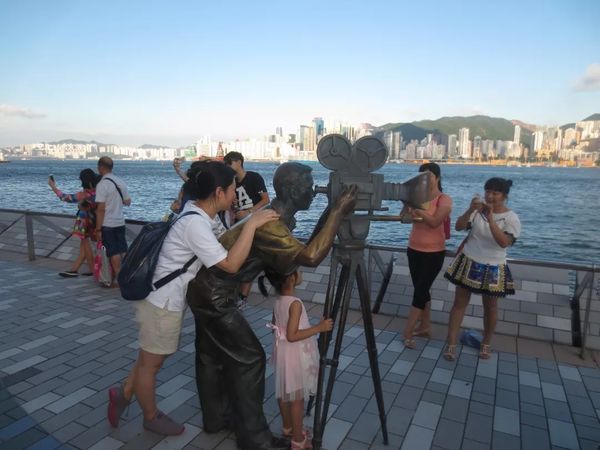
但是,如果香港扮演不来这个角色,那么它在海峡两岸课题上对中国大陆的战略价值就要大大降低。
香港是中国的迪拜吗——让中国人前去减压?香港是中国的窗口吗——让世界可以在圈外近距离观察中国大陆并与之经商?又或者,香港是中国的一个较为成熟的经济特区——是中国式民主的试验田?
香港从未曾是民主社会,它如果作为民主制度的试验田,也需要摸着石头过河。但是,香港的优势在于,它无须建立、维持自己的军事力量,因此,香港拥有更多的财务自由度,香港居民无须负担兵役义务。
新加坡则有点幸运。战后的新加坡就展开了一系列的试验——在新马合并和新加坡独立之前,它就经历过市议会选举、自治(除国防和外交事务以外)。
从中,新加坡人民以及政治和商界领袖学会了什么做法有效,什么做法徒劳。
对新加坡来说,生存(或者说,避免灭亡)是第一要务,迫使我们无视意识形态,快速学习。
也许,新加坡走过的路可以为香港所借鉴——通过市议会选举让人民管理自己的选区,然后进行自治,国防和外交事务除外。
英国人匆匆离去之后,为香港留下的是并未经过深思熟虑的政治体制,它既对香港无益,也不是通往具有香港特色民主的可行之路,更不用说具有中国特色的民主。
因此,唯有深入审视自身,从而确认自己究竟能在中国、在世界上扮演什么角色,是香港人最佳选项。唯有在中国的事务上扮演积极角色,香港在世界上才有发挥空间。
与此同时,在未来十年和更长远的时间内,地缘经济、区域政治和科技将影响贸易和商务,新加坡也必须重新审视自身在本区域和在世界上的角色。
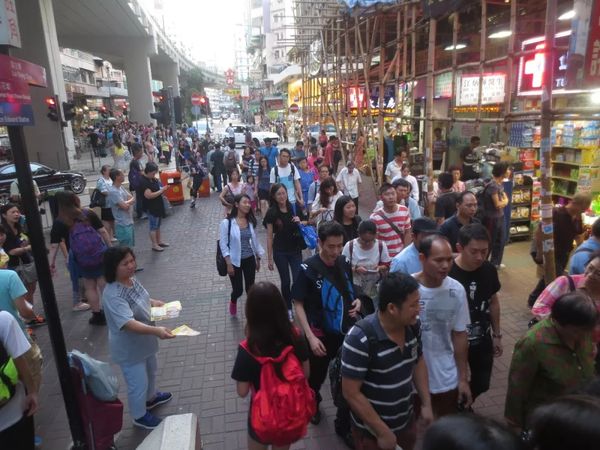
▲香港往日安居乐业
世上还有一些自然力量能吞噬我们所有人——不论我们的政治形态或意图。哪怕是世上最强大的国家所能组织的防御力量,也无法与之抗衡。
各位,为了给我们的人民、国家、家庭和后代一个更美好,更善良,更安全的世界,让我们保持冷静,深思熟虑,按部就班,果断前行。
英文原文如下
Some folks in Hong Kong appear to have an obsession with SG as a “competitor”.
Actually, the 2 economies are very different and serve different roles, despite having a common legacy of British rule.
For modern Hong Kong, the real question is what role it serves vis a vis China.
During British rule, and especially after the communist takeover of China, Hong Kong served as a trading window to China.
Post British rule, that role began to change when China joined the WTO in 2001, and continued its path of reform and economic liberalisation that began in 1978.
Mfrg soon fell from the 20-30% range (up to the 1980s) to sub-10%, as HK industries moved into China. That meant a huge employment gap from loss of more stable mfrg jobs for a whole range of workers from semi-skilled workers to mid-level supervisors and managers.
Now, there are practically no more mfrg jobs in HK - mfrg is now less than 5% of its GDP, around 2-3%.
[Afternote: Latest World Bank data shows 1% share of GDP for manufacturing in HK in 2017. This is down from a peak of just over 30% in 1970, when HK was well on its way as one of the 4 little dragons in East Asia.]
So HK became a service centre for China.
But think about it - which was the financial and business centre of China prior to 1949, and prior to British takeover of HK?
Shanghai was the key financial centre of China, with other thriving centres in Beijing for the north and Guangzhou for the south.
HK never served that role in the long history of China until the British came along and post-war China closed up in an ultimately failed experiment in self sufficiency.
So as China opened up, its real competition is in China - Shanghai, Guangzhou and BJ.
With liberalisation, the Chinese economy reached about US$1 trillion by about 2000, about 6 times the size of HK GDP.
With a further integration with the world economy post joining WTO, China’s GDP has grown over 10 times by 2018. Meanwhile, HK’s GDP has doubled.
HK’s GDP is now about 3% of China’s GDP. In other words, China’s economy is over 30 times the size of HK’s economy.
Even Shenzhen, which was only a thinly populated fishing or farming village before 1980, has now surpassed HK in both GDP terms and in its collection and density of top Chinese talents from all over China. True, Shenzhen was an SEZ, but that showed the promise of economic liberalisation even before China joined the WTO.
So the real question is what role should HK play vis a vis China, and vis a vis the world.
Being obsessed with the movement of some money and people to SG (and ignoring the movement of people and money elsewhere to USA, Canada, Australia, UK, esp for their professional talents), just misses the point.
Just as we do not have a choice who our parents are, both HK and SG have no choice in their geographical location.
HK is bound to China in her history and geography, just as SG is firmly fixed geographically in South East Asia.
The British used HK as a trading post for China, and SG as a trading post for spices in South East Asia.
The added role for SG has been the headquarters of the British Far East Command, until WW2 broke the myth of British naval superiority.
SG found its way to survive post independence.
HK in the main depended on the largesse of China for a small sliver of services.
The beginning of this decade saw some multinationals deciding to relocate or locate directly in Chinese cities such as Shanghai.
The living conditions have improved and the confidence also grew, for them to consider Chinese cities as direct alternatives to HK, especially when they have huge mfrg plants in China.
True, some Chinese go to HK too, or based themselves there. It was attractive to some Chinese as there were no restrictions on the number of kids, etc - and even that is loosening up in China.
If China continues to loosen up and improve its conditions for living, the real challenge to HK is what role does HK play for China and for the world?
Over the last 22 years, the real value of HK to China is as a demonstrator of the One China Two Systems concept, as a way to try to entice Taiwan back into her fold.
But if this is shown not to work, then the strategic value of HK vis a vis the all important question of Taiwan for China will greatly diminish.
Is HK the Dubai of China, where the Chinese go to decompress? Is HK the window of China where the world goes to have a ringside seat to watch and do business with China? Is HK another more sophisticated SEZ to experiment with the evolution towards democracy with Chinese characteristics?
HK itself had never been a democracy, so even HK would have to feel its way forward as a democratic petri dish. But HK has had the advantage of never having to raise and keep its own military - it has thus more financial freedom and its population freed of military service obligations.
SG was a little more fortunate - it has had its own experiment which began in post-war SG - municipal elections, self government (autonomous govt except in defence and foreign affairs), before merger and independence.
So the SG population and political and business leadership learnt what works and what doesn’t.
And survival (or rather, the threat of extinction) is the biggest driver for learning fast without the cloud of ideology.
Perhaps the example of SG could hold lessons for HK in terms of political pathways - municipal elections for people to look after their own districts, followed by self govt in all but defence and foreign affairs.
The thoughtless political structure that the British left behind hastily for HK is not a favour for HK, nor a viable route to democracy with HK characteristics, much less democracy with Chinese characteristics.
So Hongkongers can best serve themselves by looking deep within themselves to decide what role they wish to play in and for China. Only when they can play a relevant role in and for China, would Hong Kong also find its role in the world too.
Meanwhile, SG too needs to rethink its role in its own region and in the world, in the light of what the geo-economics, regional politics and technology will be doing to shape the flows of trade and business over the next decade and more.
There are forces of nature too which can engulf us all - they are no respector of political ideologies or intentions - and they are more powerful than the defences which the most powerful nations can muster on earth.
So keep well folks, stay calm, think deeply, and act methodically and decisively, for a better, kinder, safer world for our people and country, our families, our future generations.
你认同李显龙夫人的看法吗?
点评
东南亚之于新加坡,即中国大陆之于香港。没有东南亚,就无新加坡之立足根本;没有中国大陆,香港无论在历史上或未来皆难有发挥空间。当年中国大陆封闭之时,香港游走于中国大陆和外界之间,左右逢缘,游刃有余。犹记当年海峡两岸未通航,许多航班皆得停经香港,可见一斑。新加坡情况亦然,若非当年英、荷在东南亚争霸,则无开通石叻为自由港之必要。新加坡所幸者,制造业未空心化,通过几次经济转型,能继续为广大国民提供就业机会;通过社会制度如组屋、国民服役、公积金,把人民的未来与国家社会的未来紧绑在一起,俱荣俱毁;通过土地政策和税收政策,防止贫富两极化;通过对极端主义和语言、种族、宗教等敏感课题的治理,让社会不出现无法修复的撕裂;通过外交和军队,维持本身在东南亚地区的独立自主,维持政治稳定,投资教育与终身学习,让投资者有信心并看好新加坡前景,继续为新加坡创造就业机会,使国民无明日衣食之忧。这些是新加坡没有走向剧变的主要原因。
评论列表 共有 0 条评论
最新导读

热门文章




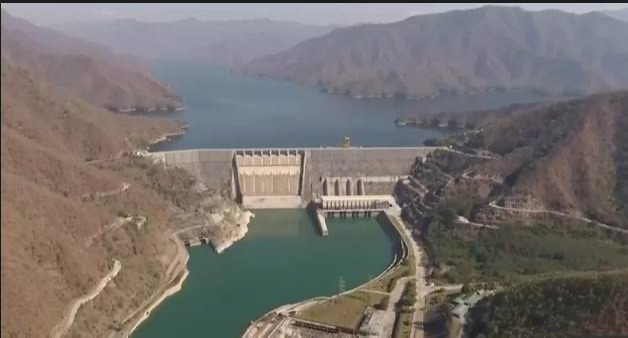

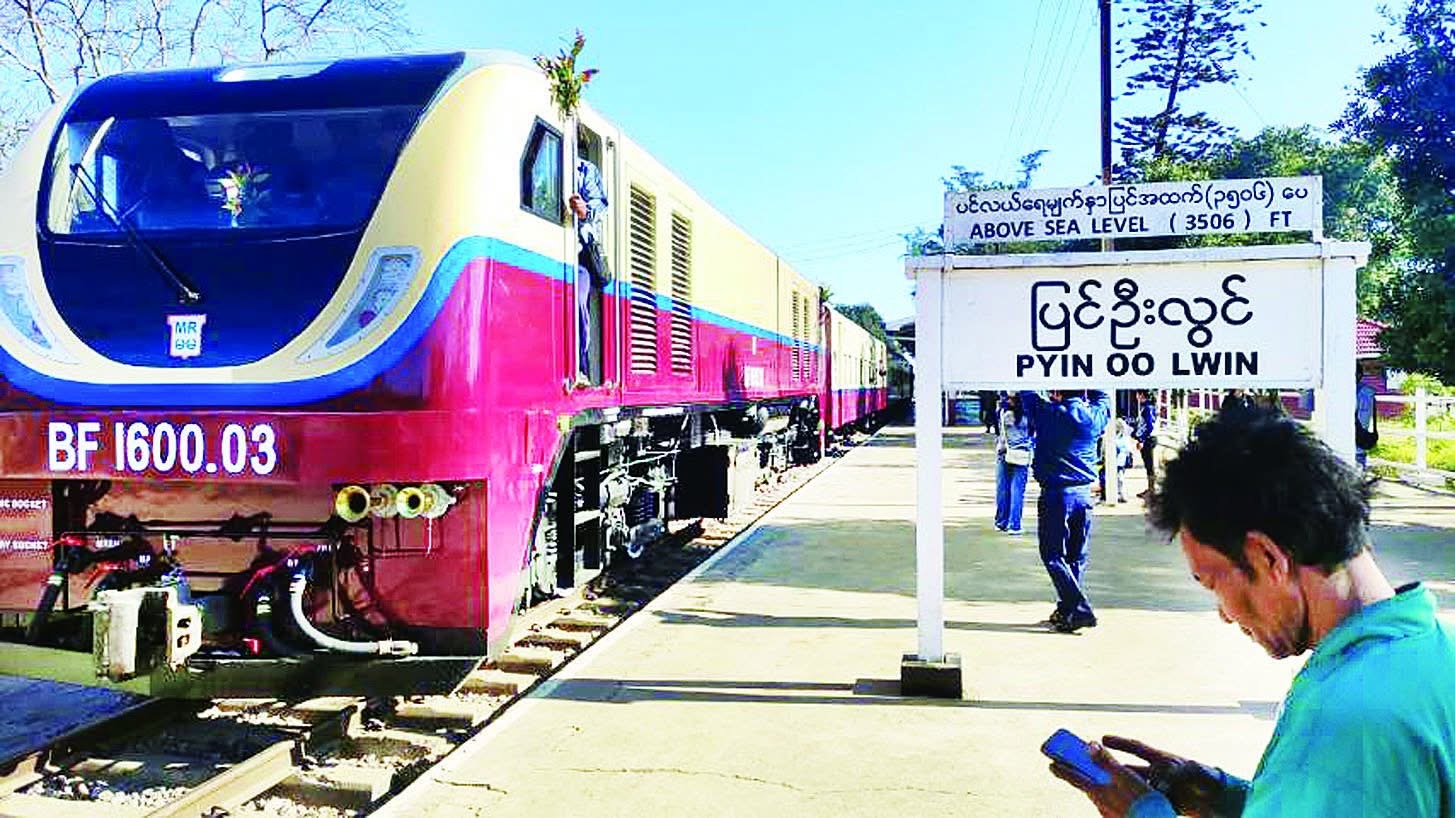
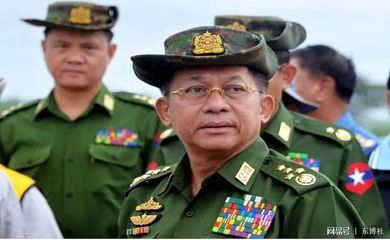
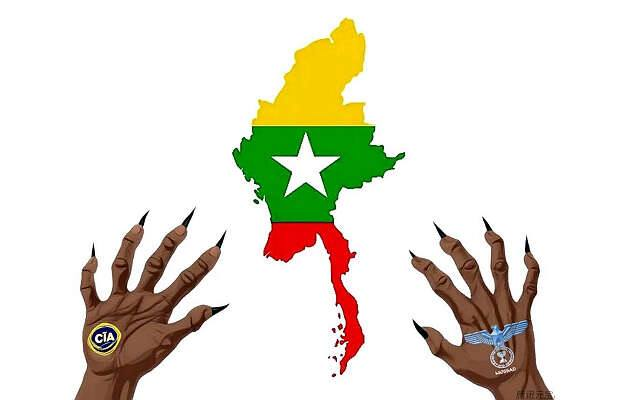
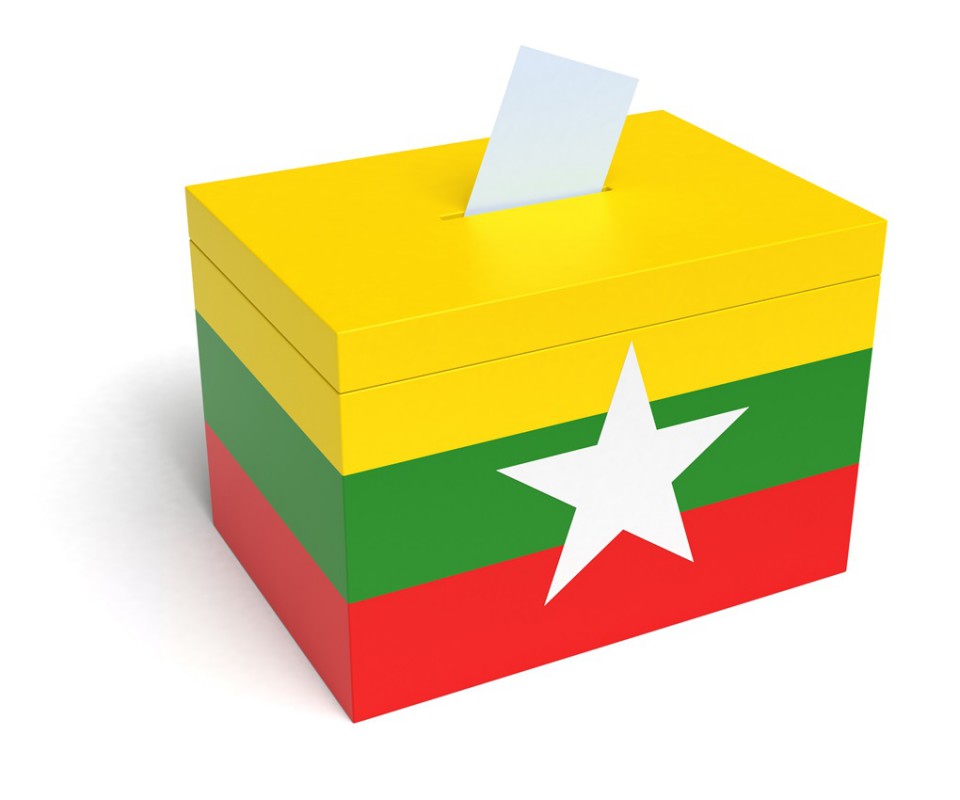
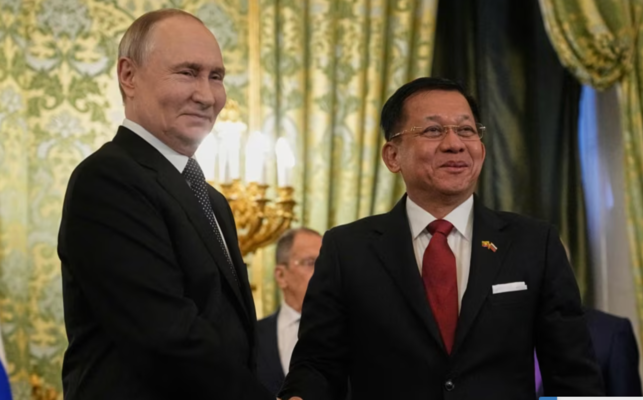
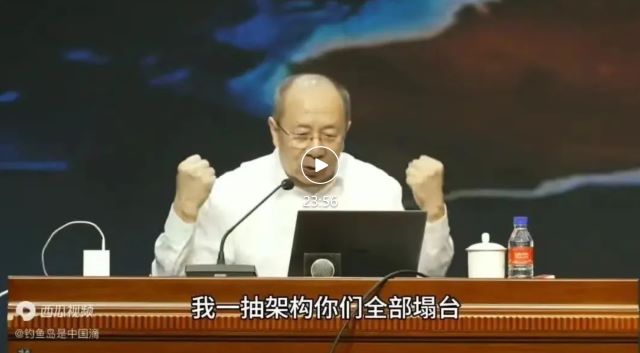

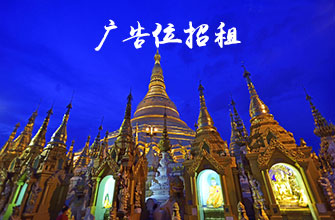


发表评论 取消回复